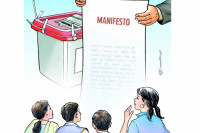National
Economist Poudel named Nepal Rastra Bank governor
Decision ending protracted dispute over the central bank’s leadership also hints at a thaw in Congress-UML relations.
Anil Giri
A months-long tug-of-war between the ruling Nepali Congress and CPN-UML parties over the appointment of the central bank governor ended on Tuesday after the government appointed economist Biswo Nath Poudel as new governer of the Nepal Rastra Bank.
He is the 18th governor of the central bank.
Poudel earlier served as vice-chairman of the National Planning Commission for 14 months. He then contested the general elections from Chitwan-3 on a Nepali Congress ticket in 2022. (He lost to Hari Dhakal of the Rastriya Swatantra Party.)
On Tuesday afternoon, a Cabinet meeting, based on the recommendation of a search committee led by Deputy Prime Minister and Finance Minister Bishnu Poudel, decided to appoint Poudel as the new governor, said government spokesperson Prithvi Subba Gurung. With the governor’s appointment, the crisis of confidence between the Congress and UML is expected to ease.
Just before the Cabinet meeting, the three-member search committee led by Finance Minister Poudel had recommended three names for the position of governor. The names proposed by the committee—Biswo Poudel, Neelam Dhungana Timilsina, and Dinesh Bhattarai—were tabled in the Cabinet on Tuesday evening.
Economist Poudel’s name was at the top of the list and the Cabinet decided to honour the priority. “This was a long-awaited decision,” said Gurung.
Timilsina is currently deputy governor following the retirement of former governor Maha Prasad Adhikari on April 4, while Bhattarai is a former government secretary. The members of the finance minister-led recommendation committee included former Nepal Rastra Bank governor Maha Prasad Adhikari and economist Poshraj Pandey.
Earlier on Tuesday, Prime Minister KP Sharma Oli and Nepali Congress chief Sher Bahadur Deuba had reached an understanding to appoint Poudel as the new governor.
Initially, the Congress had proposed the name of Gunakar Bhatta, the executive director of Nepal Rastra Bank. But Deputy Governor Timilsina refused to accept his resignation. To be eligible for the post of governor, Bhatta had submitted his resignation, as required by law.
A writ petition was also filed in the Supreme Court against Bhatta’s nomination for the post.
Similarly, advocates Pratibha Upreti, Bishal Thapa, and others reached the Supreme Court to file a writ petition arguing that economist Poudel was unfit for the role and should not be appointed. But the court’s administration refused to register the case. After this, advocates Thapa and Upreti again approached the court bench challenging the administration’s decision against registering the petition.
The Supreme Court has upheld its administration’s decision to decline the writ petition filed against Poudel on Tuesday, paving the way for the government to recommend and appoint him to the post of governor.
Supreme Court spokesperson Achyut Kuinkel said that a bench of Justice Sapana Pradhan Malla upheld the administration’s decision.
However, the possibility of a future writ challenging his qualifications cannot be ruled out even after the appointment.
The government initially formed the recommendation committee on March 24, led by Finance Minister Poudel, with economist Poudel and former NRB governor Bijaya Nath Bhattarai as members.
However, due to disputes between the two main coalition partners, the committee had been unable to meet since its formation.
According to the Nepal Rastra Bank Act, the government is required to appoint and announce a new governor at least a month before the term of the outgoing governor ends. However, even though the post had been vacant for a month and a half, the Poudel-led committee had been unable to recommend a name to the Cabinet due to the Congress-UML political deadlock.
Bhattarai resigned from the committee on April 22, expressing dissatisfaction. The government then appointed immediate-past governor Adhikari in his place.
Later, Poudel himself stepped down as a member after political preparations to pick him as governor started. On May 14, economist Poshraj Pandey was inducted into the committee to replace Poudel.
Although the committee was reconstituted, it still did not meet formally due to ongoing disagreements between the Congress and the UML leaders.
Prime Minister Oli had earlier said that, just as he had appointed the first female President, he also intended to appoint a woman as governor.
“In our discussions, the prime minister had expressed his desire to appoint Timilsina as the next governor,” a senior Nepali Congress leader said. But amid mounting public frustration over the delay and increasing pressure from the Congress, the prime minister finally decided to take a final call.
Meanwhile, as the appointment process moved forward, four cases were filed in the Supreme Court. One challenged the government’s decision to remove the age limit of 65 years for appointments to public office. The Supreme Court issued an order not to remove the age cap.
Another case questioned Bhatta’s eligibility following the non-acceptance of his resignation from the Nepal Rastra Bank. One more petition was lodged against the inclusion of the former governor Adhikari in the recommendation committee. And yet another was filed against Poudel.
Who is Poudel
Poudel, a professor at Kathmandu University, is also an expert in natural resources, labour economics, and economic history. He holds a PhD in Agricultural and Resource Economics from the University of California at Berkeley.
He previously served as the vice chairperson of National Planning Commission (NPC), chair of board of governors of International Center for Integrated Mountain Development (ICIMOD) and president of Colombo Plan council.
At present he is a visiting professor at Kathmandu University School of Management. He also served as Economic Advisor at the International Labour Organisation (ILO), an economist at the Office of Millennium Challenge Account Nepal, and an advising vice-chairman of the National Planning Commission (NPC).




 11.12°C Kathmandu
11.12°C Kathmandu















